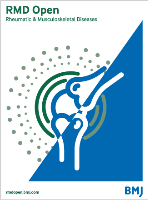
Nature Reviews Rheumatology
Scope & Guideline
Fostering innovation for better health outcomes.
Introduction
Aims and Scopes
- Pathophysiology of Rheumatic Diseases:
The journal focuses on the underlying biological mechanisms and genetic factors that contribute to various rheumatic diseases, including systemic lupus erythematosus, rheumatoid arthritis, and osteoarthritis. - Diagnosis and Management Strategies:
It provides insights into contemporary diagnostic criteria, management guidelines, and therapeutic interventions for rheumatic conditions, emphasizing evidence-based practices. - Innovative Therapies and Drug Development:
Nature Reviews Rheumatology highlights advancements in pharmacological treatments, including biologics, JAK inhibitors, and emerging therapies, discussing their efficacy, safety, and mechanisms of action. - Interdisciplinary Approaches:
The journal promotes interdisciplinary research that combines rheumatology with genetics, immunology, and epidemiology, showcasing studies that explore the intersection of these fields. - Patient-Centered Care and Outcomes:
It emphasizes the importance of patient-reported outcomes, quality of life assessments, and personalized medicine approaches in the management of rheumatic diseases.
Trending and Emerging
- Precision Medicine in Rheumatology:
There is a growing emphasis on precision medicine approaches that tailor treatments based on individual patient profiles, genetic markers, and disease subtypes, enhancing therapeutic outcomes. - Immunotherapy and Targeted Treatments:
The trend towards exploring immunotherapy, including CAR T-cell therapies and monoclonal antibodies, is on the rise, indicating a shift towards innovative treatment modalities for autoimmune diseases. - Role of the Microbiome:
Emerging research highlights the influence of the gut microbiome on rheumatic diseases, suggesting potential therapeutic targets and the importance of microbiome modulation in treatment. - Multimodal Pain Management Strategies:
There's an increasing focus on multidisciplinary approaches to pain management in rheumatic conditions, integrating pharmacological, physical, and psychological interventions. - Technological Integration in Patient Care:
The incorporation of technology, such as telemedicine and wearable devices, is becoming a significant theme in managing rheumatic diseases, particularly in light of the COVID-19 pandemic.
Declining or Waning
- Traditional DMARDs and Their Use:
There is a noticeable reduction in publications specifically addressing traditional disease-modifying antirheumatic drugs (DMARDs) as newer therapies like biologics and JAK inhibitors gain more attention. - Generalized Autoimmunity Concepts:
Research papers focusing on generalized theories of autoimmunity without specific disease context have decreased, as more targeted studies emerge, emphasizing disease-specific mechanisms. - Epidemiological Studies without Novel Insights:
There is a waning interest in epidemiological studies that do not present new insights or innovative methodologies, as the field shifts towards more translational and clinical research.
Similar Journals

Arthritis & Rheumatology
Connecting Researchers to Transformative DiscoveriesArthritis & Rheumatology is a leading journal dedicated to the advancement of knowledge in the fields of rheumatology, immunology, and allergy. Published by WILEY in the United Kingdom, this prestigious journal boasts an impressive impact factor and a prominent reputation, ranking in the Q1 category across multiple disciplines, including Immunology and Rheumatology. With its high ranking of 4th out of 73 in Rheumatology and notable standings in related fields, it serves as a crucial platform for researchers, healthcare professionals, and scholars to disseminate groundbreaking findings. The journal embraces an Open Access model, enhancing the accessibility of vital research to a global audience and ensuring that knowledge dissemination is maximized. Since its inception in 2014, Arthritis & Rheumatology has been at the forefront of impactful research, fostering collaboration and innovation in tackling complex challenges within these medical disciplines. Researchers looking to explore the latest advancements and engage with cutting-edge studies in these fields will find this journal to be an essential resource.

SCANDINAVIAN JOURNAL OF RHEUMATOLOGY
Advancing the Frontiers of Rheumatology ResearchThe Scandinavian Journal of Rheumatology, published by Taylor & Francis Ltd, is a prestigious peer-reviewed journal dedicated to advancing research in the fields of rheumatology, immunology, and related disciplines. With an ISSN of 0300-9742 and an E-ISSN of 1502-7732, this journal has established itself as a vital platform for disseminating significant findings and innovative approaches in the management of rheumatic diseases since its inception in 1959. As a recognized scholarly outlet, it currently resides within the Q2 category for Medicine (miscellaneous) and ranks #39 out of 73 in Rheumatology according to the 2023 Scopus assessments. This reflects the journal's commitment to high-quality research and its relevance in the scientific community. Although it does not provide Open Access options, the journal's rigorous selection process ensures that only the most impactful research reaches its audience, making it a crucial resource for researchers, clinicians, and students engaged in the exploration of rheumatological and immunological challenges. The journal's broad scope encompasses ongoing studies, clinical trials, and reviews that aim to enhance understanding and treatment of rheumatic conditions, promoting collaboration and knowledge-sharing among professionals in the field.

AKTUELLE RHEUMATOLOGIE
Empowering professionals with cutting-edge rheumatology insights.AKTUELLE RHEUMATOLOGIE is a prominent German journal published by GEORG THIEME VERLAG KG, dedicated to advancing the field of rheumatology. Since its inception in 1978, this peer-reviewed journal has been a vital resource for professionals, researchers, and students engaged in the study and treatment of rheumatic diseases. With an ISSN of 0341-051X and an E-ISSN of 1438-9940, the journal provides a platform for sharing groundbreaking research, clinical studies, and reviews. Although classified in the fourth quartile (Q4) of rheumatology journals and ranked 67 out of 73 in its category according to Scopus, AKTUELLE RHEUMATOLOGIE continues to contribute to the discourse in rheumatology. Its comprehensive coverage of recent advancements and innovative approaches makes it an essential publication for anyone interested in the latest developments in the field.

ZEITSCHRIFT FUR RHEUMATOLOGIE
Exploring cutting-edge findings in rheumatic disease treatment.ZEITSCHRIFT FUR RHEUMATOLOGIE, published by Springer Heidelberg, serves as a vital platform in the field of rheumatology, providing researchers, clinicians, and students with cutting-edge findings and discussions related to the diagnosis, treatment, and management of rheumatic diseases. Since its inception in 1974 and continuing until 2024, this journal retains its commitment to disseminating significant scientific work within this specialized domain. Although it is currently categorized in the Q4 quartile for Rheumatology and ranks 47 out of 73 in Scopus, reflecting its burgeoning presence, the journal is dedicated to evolving and gaining prominence in the academic community. By offering valuable insights and fostering scholarly discourse, ZEITSCHRIFT FUR RHEUMATOLOGIE plays a crucial role in advancing rheumatology research and enhancing patient care practices worldwide. The journal presents an opportunity for its readers to engage with contemporary studies and enrich their understanding of rheumatic ailments.

RMD Open
Advancing knowledge in Immunology and Rheumatology.RMD Open, published by the BMJ Publishing Group, is a leading open-access journal that has made significant contributions to the fields of Immunology, Immunology and Allergy, and Rheumatology since its inception in 2015. With an impressive Q1 ranking in these categories for 2023, the journal has established itself as an essential platform for the dissemination of high-quality research, case studies, and reviews that advance understanding and treatment strategies in these critical areas of health. As an open-access publication, RMD Open ensures that its content is freely accessible to a global audience, promoting collaboration and knowledge sharing among researchers, clinicians, and students. Based in the United Kingdom at the British Medical Association House, RMD Open is not only dedicated to improving patient care but also to fostering innovative research and discussions in the rapidly evolving landscape of rheumatic diseases.

International Journal of Rheumatic Diseases
Elevating the discourse on rheumatology.The International Journal of Rheumatic Diseases, published by WILEY, serves as a crucial platform for disseminating high-quality research and advancements in the field of rheumatology. With an ISSN of 1756-1841 and an E-ISSN of 1756-185X, this journal has established itself within the academic community since its inception in 2008, and it is set to continue until at least 2024. Positioned in the Q3 category of rheumatology, the journal holds a significant rank of #38 out of 73 in its field according to Scopus, showcasing its growing influence despite the competitive environment. The absence of Open Access reflects a traditional scholarly publishing model, allowing for meticulous peer-review processes to ensure the rigor and reliability of published studies. This journal aims to foster innovative research, critical reviews, and clinical studies, thereby contributing to a deeper understanding of rheumatic diseases and enhancing patient care. The dedicated readership, including researchers, healthcare professionals, and students, will find valuable insights into the latest findings and methodologies relevant to rheumatology in the journal's comprehensive articles.

Acta Reumatologica Portuguesa
Transforming clinical practices with cutting-edge findings.Acta Reumatologica Portuguesa is a premier open access journal dedicated to the field of rheumatology and general medicine, published by PUBLISAUDE-EDICOES MEDICAS LDA since its inception in 1973. Situated in Portugal, this journal aims to disseminate high-quality research findings, clinical studies, and reviews that contribute to the understanding and management of rheumatic diseases. Despite its current Q4 ranking in both Medicine (miscellaneous) and Rheumatology, it serves as a vital platform for researchers and professionals aiming to share innovative insights and clinical practices within a rapidly evolving field. Researchers and medical professionals will find valuable information that can significantly influence their work, given the journal’s commitment to accessible knowledge through its open access model. By prioritizing collaboration and knowledge-sharing, Acta Reumatologica Portuguesa continues to engage with issues of critical relevance in rheumatology, appealing to a diverse audience of scholars and healthcare practitioners.

Journal of Rheumatic Diseases
Shaping the future of rheumatic disease research together.Journal of Rheumatic Diseases, published by the Korean College of Rheumatology, stands as a pivotal platform in the field of rheumatology, contributing significantly to the advancement of knowledge and clinical practice since its inception. With an impact factor reflecting its esteemed position in the academic community, this open-access journal promotes accessibility to high-quality research, ensuring that groundbreaking discoveries are reachable to all stakeholders in the realm of rheumatic diseases. The journal has maintained its commitment to quality, evidenced by its ranking in the Q3 category for Rheumatology in 2023, and its presence among the top quartiles of medical research. Focusing on innovative therapeutic approaches, emerging diagnostic techniques, and comprehensive reviews, the Journal of Rheumatic Diseases seeks to foster collaboration and dialogue among researchers, clinicians, and students alike. For accessibility, the journal offers numerous articles since its transition to open access in 2017, thereby facilitating research dissemination across the globe. As it converges over the years from 2019 to 2024, the journal promises to be instrumental in shaping the future of rheumatic disease research, inviting contributions that inspire new frontiers in this essential field.

Advances in Rheumatology
Elevating rheumatology research for a healthier future.Advances in Rheumatology is a premier open-access journal published by BMC, dedicated to advancing the field of rheumatology through high-quality, peer-reviewed research. Launched in 2018, the journal has quickly established itself within the academic community, achieving a commendable Q2 ranking in the category of Rheumatology as of 2023 and ranking #34 out of 73 in the Scopus Medicine Rheumatology listings, placing it in the 54th percentile. With a focus on innovative treatments, patient care, and the latest in rheumatological research, the journal provides a platform for researchers and clinicians to disseminate their findings and foster collaborative advancements in this critical area of medicine. Recognized for its accessibility, the journal follows an open-access model, ensuring that research is freely available to a global audience. With a commitment to high standards of academic rigor, Advances in Rheumatology plays a vital role in enhancing the understanding and treatment of rheumatic diseases, making it an invaluable resource for researchers, professionals, and students alike.

AMERICAN JOURNAL OF CLINICAL DERMATOLOGY
Advancing Clinical Insights for Healthier SkinThe American Journal of Clinical Dermatology, published by Adis International Ltd, is a leading peer-reviewed journal dedicated to advancing the field of dermatology. With a notable impact factor and a prestigious Q1 rank in both Dermatology and Miscellaneous Medicine categories, this journal stands out as a valuable resource for researchers and clinicians alike, offering cutting-edge insights into clinical practice and innovative treatment strategies. Its comprehensive scope encompasses a broad range of topics within dermatology, addressing both common and rare conditions, with a focus on emerging therapies and technologies. As it converges its publication years from 2000 to 2024, the journal remains an essential platform for disseminating high-quality research to professionals striving to improve patient care and outcomes. With the ISSN 1175-0561 and E-ISSN 1179-1888, the American Journal of Clinical Dermatology facilitates greater accessibility to pivotal findings within the field, making it an indispensable resource for anyone involved in dermatological research and practice.